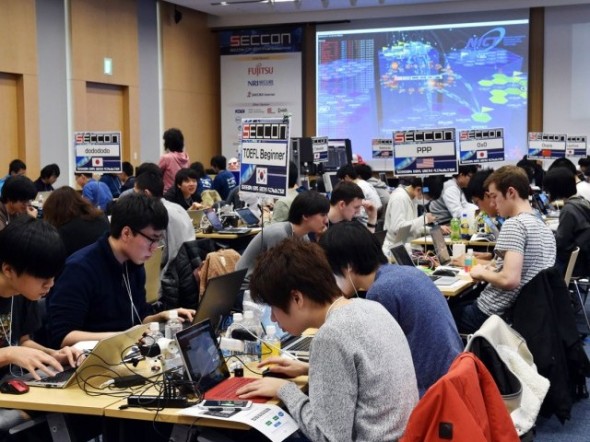redo Jump to...
print Print...

Some 90 participants in 24 teams from seven nations and regions from China, Japan, Poland, Russia, South Korea, Taiwan, and the U.S. compete in their hacking skills at the final rounds of the Security Contest 2014, SECCON on February 7, 2015. (Photo: AFP)
(from Agence France-Presse) — The final rounds of a cyber security competition began Saturday in Tokyo, with organizers aiming to show off the skills of young Japanese hackers by testing them against international rivals.
The final rounds of the Security Contest 2014, or SECCON, brought together 90 participants in 24 teams from seven nations and regions: China, Japan, Poland, Russia, South Korea, Taiwan, and the United States. [Contestants competed in a number of sections such as cryptanalysis – analyzing computer systems to detect hidden weaknesses – and programming.]
The winners of the Tokyo competition will advance to the prestigious Def Con CTF (Capture the Flag) competition, slated for later this year, organizers said.
SECCON was designed to allow young Japanese technology engineers to show off their skills on the world stage, while also encouraging more to get into the field of cyber security. [This is the first time that teams from outside Japan have been invited to take part in the final, a move intended to find more talent to join the fight against Internet threats and crimes.]
Teams competed for points by hacking six virtual servers to discover particular keywords, and could also intervene to stop their rivals’ cyberattacks.
“There is a need for a forum where fledgling, young… hackers can grow and gain understanding of their families, schools and the outside world,” said Yoshinori Takesako, the head of the SECCON organizing committee.
“This is important in order to keep them away from being pulled into the underground world,” he said in a statement to AFP.
The Japan-based event has drawn a total of 4,186 participants from 58 countries through various qualifying rounds. [The competition is run by the Japan Network Security Association. Of the more than 1,300 people entered last year, fifty-five percent were students.]
Takesako said the organizers, supported by government agencies, tech firms, and scholars, also want to change the media image that Japan lags other nations in the cyber security field.
[ChinaNews reports: “The young IT security enthusiasts taking part in the competition are often called “white-hat hackers” to distinguish them from malicious individuals or groups that identify and attack security loopholes. White-hat hackers advise businesses and government departments about Web security risks.”]Reprinted here for educational purposes only. May not be reproduced on other websites without permission from Agence France-Presse. Visit the website at Agence France-Presse .com.
Questions
1. What is SECCON?
2. What is the purpose of SECCON? Be specific.
3. a) How many people competed in SECCON this year? How many were left in the finals?
b) List the countries whose teams made it to the finals.
4. What did contestants do during the competition?
5. What do “white-hat” hackers do?
Background
What does White Hat Hacker mean?
A white hat hacker is a computer security specialist who breaks into protected systems and networks to test and asses their security. White hat hackers use their skills to improve security by exposing vulnerabilities before malicious hackers (known as black hat hackers) can detect and exploit them. Although the methods used are similar, if not identical, to those employed by malicious hackers, white hat hackers have permission to employ them against the organization that has hired them.
Techopedia explains White Hat Hacker
White hat hackers are usually seen as hackers who use their skills to benefit society. They may be reformed black hat hackers or they may simply be well-versed in the methods and techniques used by hackers. An organization can hire these consultants to do tests and implement best practices that make them less vulnerable to malicious hacking attempts in the future.
For the most part, the term is synonymous with “ethical hacker.” The term comes from old Western movies where the cliché was for the “good guy” to wear a white cowboy hat. Of course, the “bad guys” always seemed to wear a black hat. (from techopedia.com/definition/10349/white-hat-hacker)
Daily “Answers” emails are provided for Daily News Articles, Tuesday’s World Events and Friday’s News Quiz.



